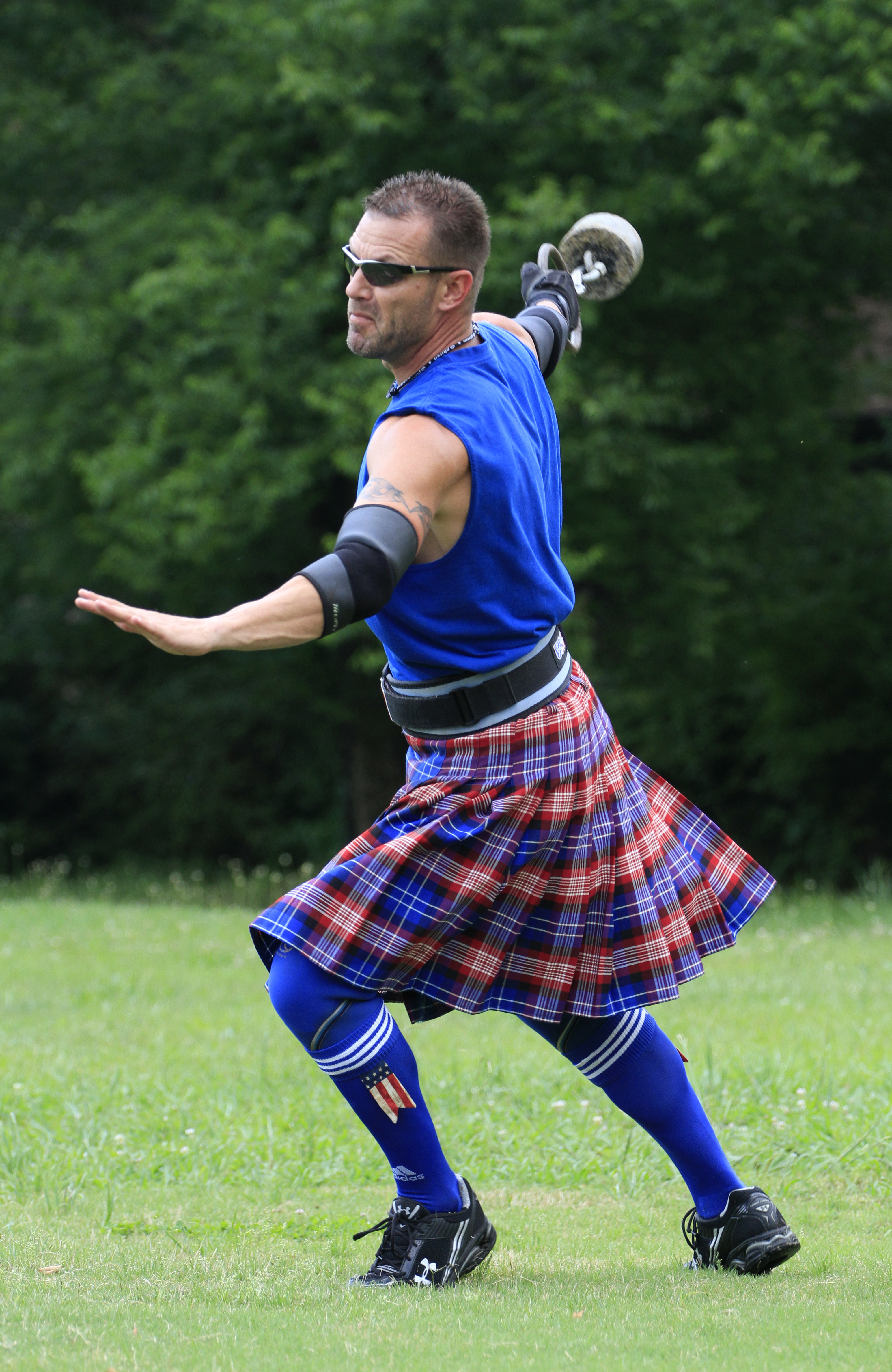East Ridge trainer to represent USA in international highland games competition (with video)
Friday, January 1, 1904
Highland games masters eventsStone put: A 20- to 26-pound stone is thrown from a standing position and a 16- to 22-pound stone is thrown with a spinning or shuffling start.Weight throw: 28- and 42-pound weights attached to chains are thrown for distance.Hammer throw: A 16-pound hammer is thrown for distance.Caber toss: Athletes attempt to flip a log about 20 feet tall and 175 pounds and have it land pointing straight away from them.Sheaf toss: Athletes use a pitchfork to toss a 16-pound bag stuffed with straw or rope as high as possible.Weight over bar: Athletes throw a 42-pound weight with a handle as high as possible.
Clad in his red, white and blue kilt, Rob Hatch chucks a rock bigger than his head and hurls hammers across the fields behind Good Shepherd Lutheran Church in East Ridge.
He's not clearing the fields; he's doing it for fun.
Today, the gym owner and former Marine will represent the United States in the Masters World Championship Highland Games in Greenville, S.C., in the under-200-pound, 40-plus age division.
Hatch isn't just pushing himself for victory. He's ready to set some world records.
Scottish Masters record keeper Thom Van Vleck, who's competed in highland games for nearly 20 years, likes Hatch's chances.
"I think they're very good. ... He should break [both stone put] records," he said.
The lean, 6-foot-4 Hatch says he often competes against men a half foot shorter whose mounds of muscle make their arms jut out from their torsos. To compensate, he has developed his own techniques that complement his size and explosive energy to heft weights the size of cannonballs through the air and shotput a 16-pound stone that he found in Soddy Creek and will bring to the games.
"I've kind of broken the mold," he said.
For example, instead of simply throwing the 42-pound stone in the Weight Over Bar event from a standing position, Hatch demonstrated the spinning method that he'll employ. While it can trip up stockier competitors, the technique gives him more momentum and the opportunity to employ more fast-twitch muscles, which provide explosive power.
In the Weight Over Bar and Stone Put events, he's "literally inches away [from breaking the world record]," he said.
"If he can make weight and still maintain his abilities, he should be the favorite in that group," Van Vleck said, though he noted that it can take awhile for an athlete who loses a lot of weight to get used to his body's new leverage.
After coming in fourth in the unlimited weight division of the 2009 games in Scotland, Hatch has committed himself to losing 68 pounds to compete in the under-200 division, dropping 42 pounds since January. He noted that losing so much weight has helped him be a more empathetic and effective weight loss trainer at his gym, Hatch Impact Training in East Ridge.
Hatch describes with enthusiasm about the sport's history -- of how the chained weights he'll throw were once used to unhorse medieval soldiers. The log Hatch must flip as straight as possible in the caber toss approximates the kind siegers in Middle Ages would use to scale a castle wall, when a leaning pole could turn the tide of battle.
Eventually, rival clans adopted these battlefield abilities into the Highland Games events.
"The really cool thing is that all these events have been going on for a thousand years," Hatch said.
Even the sport's awards remind competitors of their martial past. In his gym, Hatch displays the sword he won for first place in the Florida state competition, while silver medals are replaced by axes and bronze by dirks.
Hatch has risen to prominence in the games quickly after discovering the sport five years ago while visiting a Scottish festival in Stone Mountain, Ga. He signed himself for the amateur competition on a whim and nearly clobbered spectators twice while attempting his first sheaf tosses. But he loved the tradition of the sport and the camaraderie between the athletes.
"I knew I was hooked," he remembers, "Forget church softball and basketball, I'm doing this."

